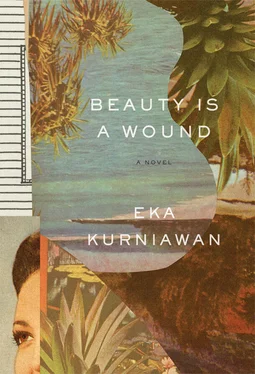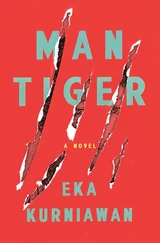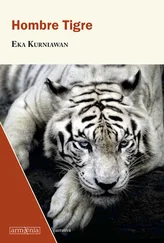The road was desolate and abandoned. She had heard that most adult men had gone to the jungle to join the guerrillas. She only saw one old barber on the corner, about to die from boredom waiting for a customer. The only other people she saw were some KNIL soldiers guarding the city while reading old newspapers, looking sleepy and just as bored. Some sat behind the steering wheels of their trucks and jeeps while others perched on a tank. They greeted her warmly, after realizing that she was a white woman, and offered to escort her because it wasn’t safe for a Dutch woman to be out walking by herself. A guerrilla could appear at any time, they said.
“No thank you,” she said. “I am on a treasure hunt and I don’t want to share.”
She followed a path that was burned into her memory, heading toward the neighborhood that had belonged to the Dutch plantation owners. The houses were pressed up against the beach, with their front verandas facing a narrow road that extended the length of the shore and their back porches facing two hills that rose up in the distance behind the lush greenery of the plantations and farmland. She arrived there after a peaceful journey, following the beach path, feeling confident that no guerrillas would suddenly emerge out of the sea. Everything looked exactly as it always had. The fence still overflowed with chrysanthemum blooms, and the starfruit tree still stood next to the house with a swing hanging from its lowest branch. The flowerpots that her grandmother had lined up along the veranda were still there, even though all the aloe had died from dehydration and the elephant ears were a tangled mess. Clearly no one was tending to the wild grass or the orchids growing on the front arbor, which dangled down to the ground. She quickly realized that the servants and guards had left the house behind, and apparently not even the borzois lived here anymore.
She pushed the baby carriage into the front yard, and was confused by the clean veranda floor. Someone must have swept away all the dust, she thought. When she tried the door, she found it unlocked. She went in, still pushing the carriage even though the babies were starting to fuss. The sitting room was dark and she turned on a light. The electricity still worked, and in an instant everything was illuminated. Everything was still in its place: the tables, chairs, and cupboards, everything except the gramophone that Muin had taken with him. She found her own portrait still hanging on the wall, a young girl of fifteen years who was about to enroll at the Franciscan School.
“Look, that’s Mommy,” she said to Alamanda. “Photographed by a Japanese guy, and shortly after that raped by another Japanese guy, who might even be your Japanese daddy.”
The three of them continued their tour around the house, and went up to the second floor. Dewi Ayu shared all her memories, telling them where grandpa and grandma used to sleep, and showing them the photograph of Henri and Aneu Stammler, taken when they were still quite young and had not yet fallen in love. Of course the little ones didn’t understand any of it yet, but Dewi Ayu still enjoyed her role as a tour guide until she remembered her treasure in the sewer pipes. She invited her two children to inspect the toilet with her, relieved to see that it even still existed. All she needed to do was dismantle the plumbing and find her treasure.
“A Dutch woman wandering about in the era of the new republic.” She suddenly heard a voice coming from behind her back. “What are you doing here, Missy?”
She turned around and there was the owner of that voice: an old native woman who looked quite fierce. She was wearing a sarong and a tattered kebaya , with a cane supporting her leg. Her mouth was filled with clumps of betel leaf. She stood looking at Dewi Ayu resentfully, as if she would strike Dewi Ayu with her cane just as she would strike a stray dog, without hesitation.
“You can see for yourself that my photograph is still hanging on the wall,” said Dewi Ayu, pointing to the portrait of that fifteen year-old girl. “I own this house.”
“I just haven’t had the time to exchange your photo with mine.”
The old woman quickly ordered her to leave, but Dewi Ayu insisted that she held the deed. In response, the woman merely laughed, waving her hand. “Your house has been confiscated, Missy,” she said. And it was clear, just as the old woman explained while seeing the uninvited guest to the door, that the house had been taken by the Japanese and at the end of the war, a guerrilla family stole it back. This was the old lady’s family: her husband had lost half his arm to the slash of a samurai sword before going to the jungle with five of his sons, and not long after that he died, shot by a KNIL soldier, along with two of those sons. “So now I have inherited this house. But you can take your photos with you if you want, and I won’t charge you for them.”
Dewi Ayu realized that there was no way to fight the woman with words. She quickly left, pushing the baby carriage, but she remained determined to get her house back. She went to the temporary civil government and military offices, met a KNIL commandant, and asked his advice. His recommendation was quite disappointing, telling her to swallow any hope of getting her house back any time soon. The situation did not yet allow it, he said, because guerrillas were still roaming about. If that house belonged to a guerrilla family, it was better to let it go, unless she had the money to buy it back.
But she didn’t have the money. Her five remaining rings would never be enough to buy a house. Her only hope, her treasure, was still in the toilet, and she would never be able to get at it without owning the house first. She met with Mama Kalong straightaway, knowing that the woman was always quick to help anyone in need, and spoke as frankly as possible. “Mama, loan me some money. I want to buy my house back.”
Mama Kalong looked at everything from a financial angle, and could always spot a good business opportunity. “And how will you repay me?”
“I have family treasure,” replied Dewi Ayu. “Before the war I buried all of my grandmother’s jewelry in a secret place and no one knows about it except me and God.”
“And what if God stole it?”
“Then I’ll come back and whore for you to pay off my debt.”
They agreed on this as the best possible idea. Mama Kalong even offered to become the mediator for the repurchasing of the house, because if Dewi Ayu did it herself, there was the possibility that old guerrilla woman would refuse to sell. A native would never trust her, with her Dutch appearance, and in any case Mama Kalong was very experienced in buying properties from people like them, who needed money. She promised Dewi Ayu she would bargain for the lowest possible price.
The whole business took almost a week. Mama Kalong went back and forth every day to meet with this fierce old woman before finishing the transaction. The guerrilla granny agreed to sell the house if she could get another house and some cash in exchange. Mama Kalong handled it well, so that Dewi Ayu could finally order the woman to leave the house and never set foot there again. Accompanied by Mama Kalong, Dewi Ayu quickly moved in with her two small children, using a military jeep that belonged to a KNIL customer at the whorehouse. How happy she was to return to her home, with the assurance that it now belonged to her.
“So when will you pay me back?” asked Mama Kalong finally.
“Give me one month’s time.”
“Yes, that’s enough for an excavation,” she said. “If someone disturbs your house, you just come to me. I have good friends who are guerrillas and of course I know KNIL soldiers. They are all my customers.”
Dewi Ayu did not immediately begin the dig. She first looked for a baby nurse, and she found her in the encampments in the foothills, an old woman named Mirah who used to be a Dutchman’s servant before the war. Dewi Ayu told her firmly that she was not Dutch, she was a native woman named Dewi Ayu. Through Mirah, she found a gardener who could get the unkempt grounds in order. It was a week before she could relax and see everything returning to how it used to be, with a clean yard and fresh-looking plants.
Читать дальше











